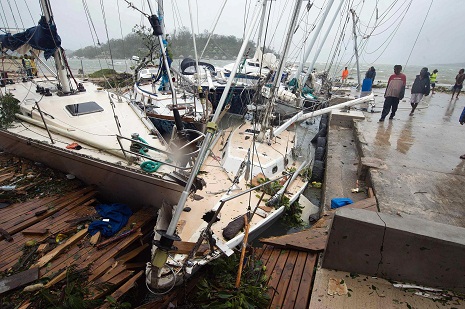Vanuatu Cyclone Pam: President appeals for "immediate" help - VIDEO

Aid has begun arriving in the storm-hit nation - one of the world`s poorest - but contact has still not been made with some of its more remote islands.
Aid agencies say it could be one of the worst disasters ever to hit the region.
The official death toll stands at eight, but it is expected to rise.
Just about every house there has received some damage and the situation for many people is bleak.
One village chief told our correspondent there was a desperate need for fresh water supplies.
he sense of devastation is absolutely immense and when you land it doesn`t take long for that sense of devastation to increase.
Many family homes have been stripped of their roofs or flattened by very powerful winds and torrential rain.
The air here is very thick with smoke because the cleanup has already begun - the debris is being chopped down, collected and burned. There is a sense here that people will rebuild but it only takes a brief moment in the capital to realise that this rebuilding effort will take many months if not years.
This is a vast archipelago, the population is spread over more than 60 islands and communications are down. It`s very difficult for the authorities to have a true picture of the devastation but it`s clear the number of dead will increase when communications are made with those outlying areas.
`A monster`
The category five storm, with winds of up to 300km/h (185mph), struck populated areas when it reached Vanuatu early on Saturday local time (+11 GMT).
President Lonsdale, who was attending a disaster preparedness conference in Japan when the storm hit, has appealed for international help, telling AFP news agency: "The humanitarian need is immediate, we need it right now."
"After all the development we have done for the last couple of years and this big cyclone came and just destroyed all the infrastructure the government has built. Completely destroyed."
Earlier, Mr Lonsdale had described the storm as "a monster", and said he had not been able to confirm that his own family was safe.
The president said climate change had contributed to the disaster, saying his country had seen changing weather patterns, rising seas and heavier-than-average rain.
Unicef worker Alice Clements in Port Vila said all the power lines were down, and many staff of the capital`s only hospital were unable to get in to work.
She told the BBC a major bridge connecting Port Vila to the eastern part of the island looked like it had "a huge bite taken out of it".
"This isn`t just some rickety bridge, it`s made of concrete and steel, and now there`s just steel girders sticking out. It really shows the sheer force of the storm."















































